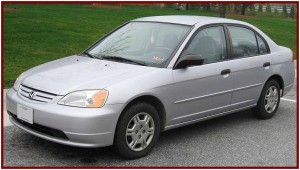
There is no accurate tracking of where service parts or used parts came from in the auto repair business - a nightmare when potentially deadly components are being used as in this case.
This Honda airbag recall originally started in November 2008 and covered about 285,000 Civic and Accord models. Now it covers 833,000 Honda and Acura Models
All automakers typically try to limit the number of vehicles covered in recalls or service actions to cut down on expenses and limit damage to their reputations. However, as investigations proceed the population of affected vehicles sometimes expands due to uncertainties around the root cause or inability to identify exactly how many parts are affected.
Increasing commonization of parts across model lines and single sourcing from suppliers contribute to large recalls, as does the web, which allows consumers victimized to fight back and file complaints against automakers on what were vehicles that, allegedly, are not defective.
In this safety defect case the Honda and Acura airbag inflators are apparently too powerful. When they explode to inflate the airbag, metal shrapnel from the casing is ejected through the airbag itself, possibly “causing an injury or fatality to vehicle occupants,” Honda said in a regulatory filing.
This latest American Honda recall now includes 2001 and 2002 Accord and Civic, 2002 Odyssey; 2002 and 2003 CR-V, some 2002 and 2003 Acura 3.2 TL and 2003 Acura 3.2 CL vehicles – about 833,000 vehicles in total that may require inspection in a search for the defective Takata airbag modules.
Takata, one of the world’ largest makers of airbag components, said in a statement that the parts it supplies to other automakers are made differently and do not suffer from the same problem.
In a statement Honda said that the newly added vehicles were not included in the earlier safety recalls because the driver’s airbag modules originally installed in them were not affected by the potential safety issue.
Toyota of course was ultimately assessed record civil fines by the U.S. National Highway Traffic Safety Administration last year for its failure to promptly recall all of the vehicles affected by deadly unintended acceleration or stuck gas pedal problems.
Honda and Acura owners of all potentially affected vehicles are now being notified because Honda has not been able to determine which specific vehicles received one of the defective Takata parts.
Honda said it is now aware of several incidents related to the earlier recall and expansions, and is announcing this new recall expansion “to encourage all owners of included valium cheap online vehicles to take their vehicle to an authorized dealer as soon as they receive mailed notification from Honda.” Notification to the expanded group of customers will begin in late May 2011.
The registered owners of the affected vehicles will be notified of this safety recall by mail. If an owner is certain that the driver’s airbag in their vehicle has never been replaced, they can inform Honda by signing and returning a postage-paid postcard that will be included with the recall notice. All others are “encouraged” to have their vehicle inspected by an authorized Honda or Acura dealer.
Honda owners can go to www.recalls.honda.com or call (800) 999-1009 and select option 4; Acura owners can go to www.recalls.acura.com or call (800) 382-2238 and select option 4.
Owners may also contact the National Highway Traffic Safety Administration’s Vehicle Safety Hotline at 1-888-327-4236 (TTY 1-800-424-9153), or go to http://www.safercar.gov.
The latest Honda recall follows a recalls this year on 2011 Odyssey vehicles in the U.S. to replace the side window glass in one or both of the front doors that can shatter. It was the second Odyssey recall in march, following an earlier one to replace a front windshield wiper linkage rod that could break on Odyssey minivans. Honda this year has also recalled Civic Hybrid models for electrical problems and other Civics for fuel pumps; Honda Fit models for engine stalling in February; as well as one in January on thousands of 2010 Honda Accord cars and CR-V sport utility vehicles, which can also suddenly stall, increasing the potential for accidents.
In December of 2010 American Honda recalled:
- 2010-11 Accord and 2011 Pilot vehicles in to prevent a potential front suspension failure
- 1998-2002 Passport SUVs for rear suspension failures
- 2007 and 2008 Honda Fit vehicles because of a bad headlight switch, which can case the low-beams to fail and possibly start a fire
During the rest of 2010 American Honda recalled:
- 2007 and 2008 model year Fit (and Jazz elsewhere) subcompacts for possible fires
- 2006 and 2007 Ridgeline pickup trucks after several of them caught fire
- 2004 through 2008 Acura TSX models for fires
- 2003 Accord models Civic models for rolling away because of a bad ignition switch
- 20003-2004 Element crossover vehicles for rolling away
- 2010 Accord Crosstour for front passenger airbags
- 2007-2008 Odyssey minivans Element crossovers for bad brakes
To be fair, Honda still tops the Consumer Reports survey on reliability. However, CR’s silence about Toyota unintended acceleration defects until widespread media notice and subsequent U.S. Congressional hearings and huge recalls and millions of dollars in cover-up fines were imposed by Federal regulators has cast in doubt the ability of CR to forecast safety issues.


Hmm. What are the chances then that some of the defective airbag units might be “used” units recovered from scrapped vehicles or stolen outright for the auto repair black market? This raises the question of what NHTSA regulators could do to prevent such happenings. Answer: probably nothing.
Airbags are not a panacea and never can be, but the Beltway “safety nazis” loved the idea because they were “passive.” So much for lawyer rather than experienced car guy approaches to safety.